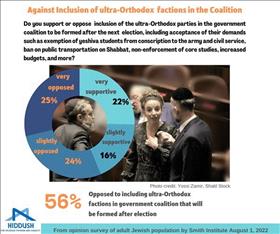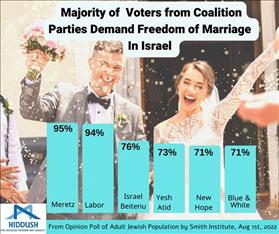A Hiddush survey provides insight into the public's priorities
Where Does the Israeli Public Stand?
Where does the Jewish Israeli public stand on the controversial issues of religion and state? We will soon publish Hiddush’s annual Religion and State Index, which provides a comprehensive overview of the many topics included in this broad category. But in the meantime, we conducted a survey more limited in scope, on two key questions that are on the public and political agenda.
Uri Regev 19/08/2022 01:26
Tags: Hiddush polls · Haredi parties · Haredim · coalition · government
The first survey question explored what kind of coalition does the Israeli public wants to see established following the upcoming elections in November, within the context of religion and state. This question is of particular importance, since this time around it becomes amply clear that not only the Likud plans to rely on the ultra-orthodox parties for the formation of the next government, but that leaders of Yesh Atid and the National Unity Party [formerly Blue & White + New Hope] who are eyeing this prospect as well also announced their wish to include the ultra-orthodox parties as partners. In addition, we asked voters about their views regarding the parties’ stand on the freedom of marriage issue.

Findings of poll conducted by Smith Institute for Hiddush
On the right, see the findings of the poll conducted by the Smith Research Institute for Hiddush- for Religious Freedom and Equality, which received extensive media exposure, on these two issues. The positions of the Jewish Israeli public are clear and consistent with past polls we have conducted. But what is no less important is the fact that they stand in obvious contradiction to what our esteemed politicians have been doing and contemplate repeating in the next round!
Hiddush’s poll found that most Israeli voters do not want a government including the ultra-Orthodox (haredi) parties like Shas or United Torah Judaism (UTJ). While some key parties in the current coalition express a desire to include the ultra-Orthodox parties so that they can establish the next coalition, it is clear that this position does not represent the wishes of their voters. The majority of the public want to be freed from religious coercion, rather than perpetuate it. 56% of the adult Jewish public in Israel are opposed to the inclusion of the ultra-orthodox parties in the next government coalition that would include concessions to ultra-Orthodox parties on matters of religion and state, according to the survey. Specifically, 79% of adult Jewish voters who are inclined to vote for Blue & White + New Hope hold this position, 89 % of Yesh Atid Voters, 94 % of Labor/Meretz voters and 90 % of Israel Beitenu voters. Among Likud voters there is resentment to such a prospect as well, and 39 % oppose it.
Read more in this Jerusalem Post article
And in i24 News
The survey also measured what percentage of the Israeli adult Jewish public (over age 18) say that it is important to them that the party they vote for in the coming elections will demand that freedom of marriage be allowed in Israel.

Findings of poll conducted by Smith Institute for Hiddush
We discovered that the establishment of a civil marriage option in Israel is important to the vast majority of voters for the current coalition parties. The poll revealed that 95% of voters from Meretz, 94% from Labor, 76% percent from Israel Beytenu, 73% from Yesh Atid and 71% of Blue and White and New Hope voters think it’s important that the politicians in their party advocate for civil marriage in Israel.
Almost three fourths (73%) of secular Israeli Jews deem it important.
You can read more about our freedom of marriage poll in this article in the Jerusalem Post